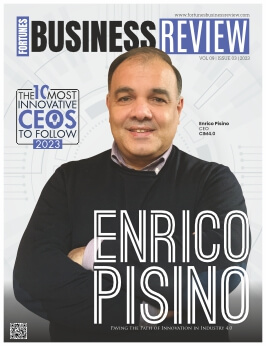Enrico Pisino: Paving the Path of Innovation in Industry 4.0
The 10 Most Innovative CEOs to Follow, 2023

At the helm of CIM4.0 as CEO, Enrico Pisino‘s visionary journey traces back to his formative years at Fiat and Chrysler. A connoisseur of technical finesse and strategic acumen, Enrico’s brilliance became evident in the dynamic 90s, where his expertise in numerical simulation propelled the automotive industry to new horizons. Not to be forgotten is his transformative contribution as the architect behind FCA’s avant-garde digital processes, a testament to Enrico’s enduring legacy in shaping the future of product development.
During Enrico’s twenty-year experience at Fiat, Chrysler, and FCA, he worked with large companies, as well as small, medium, and micro enterprises, research centers, and universities. He gained technical and managerial expertise in numerical simulation and contributed to setting up FCA’s digital process for product development in the 90s.
Throughout his career, Enrico held various positions, including director of the Advanced Manufacturing and Materials department and responsibility for Research and Innovation at Chrysler and globally. He served as the President of the National Transport Technology Cluster and has been the CEO of CIM4.0 since 2019.
Enrico believes that customized solutions are vital for every company, and teamwork and synergies drive innovation at a rapid pace. As the President of the Strategic Research & Innovation Sector for Sustainable Propulsion of the EUCAR Council, Enrico emphasizes the importance of sustainable propulsion in the automotive industry. Research and innovation are primarily focused on developing zero-emission vehicles through electric or e-fuel propulsion with batteries, biofuels, and hydrogen. Reducing costs and making these products affordable is a significant focus of the research.
Enrico envisions a future with not only batteries but also alternative fuels, including hydrogen vehicles. However, these solutions are still expensive for end-users, and further research and innovation will be necessary over the next decade to achieve full sustainability and plan for long-term commercialization.
For buses, lorries, trains, and long-distance goods transportation, real applications and scale experiments will be conducted, marking a fundamental step towards sustainable mobility. Electric battery cars, especially city cars and light quadricycles, will see increased usage in Italy and Europe, particularly in city centers. Additionally, car-sharing services with electric vehicles will become popular in many large cities.
Regarding autonomous driving, Enrico believes that it will take several more years to mature as commercial solutions are still being identified and consolidated. Start-ups will play a crucial role in this context, as well as in the economic utilization of data.
Pioneering Industry 4.0 Innovation in Italy
The Competence Industry Manufacturing 4.0 (CIM4.0), led by Enrico, is one of the eight strategic competence centers in Italy. Its primary purpose is to bridge the gap between research and businesses by facilitating the technology transfer process for manufacturing companies. CIM4.0 actively listens to the needs of these companies and provides them with cutting-edge Industry 4.0 technologies, utilizing two unique pilot lines—one specialized in Additive Manufacturing and the other focused on Digital Factory processes.
Established in 2018 by the Polytechnic and the University of Turin, along with more than twenty prominent companies, including international giants like Stellantis, General Electric Avio, Leonardo, and Thales Alenia Space, as well as various Italian and international industrial players, CIM4.0 has been operational since April 2019. In its first three years of activity, it has engaged over 300 companies in innovation plans, offered specialized courses to over a thousand participants, and facilitated more than 30 technology transfer projects.
CIM4.0 offers companies access to a diverse range of technologies, including Artificial Intelligence, the Internet of Things, Augmented Reality, and Autonomous Driving. It also provides advanced training and specialization modules that focus on upskilling and reskilling the workforce with a 4.0 perspective. The CIM4.0 Academy, now in its fifth edition, has trained over 100 innovation leaders to manage and guide the process of Green Transfer and Transition within companies.
Looking ahead, the company has approved a three-year plan for 2023-2025, emphasizing continued investment in developing models to support sustainable innovation in businesses. Additionally, they have expanded their support network by establishing a new hub dedicated to technological and training support for companies, situated in a different province in Piedmont and linked to Michelin Italia, a significant player within their ecosystem.
Through CIM4.0 and its various initiatives, Enrico and the team are playing a crucial role in advancing technological innovation and driving the growth of Industry 4.0 in Italy’s business landscape.
Engineering Training
Engineering training guides individuals to merge their skills and competences with new technologies and emphasizes CIM4.0 to optimize this combination of human qualities and technological evolution. The rapid pace of technological change necessitates continuous learning. CIM4.0 integrates cutting-edge tech and human skills for significant advancements. Engineers must adapt to the fast-paced tech world for continuous progress. A change that has evolved at a very high rate in recent decades, so the technologies in the years in which Enrico trained at the University and the Polytechnic of Turin have already been supplanted by new versions and evolutions.
Enrico states, “The tools that we use and our work change much faster today than in the past, and so it is fundamental to have the ability to navigate and steer precisely along the road we are traveling, and where we are going.”
Perspective on Blockchain and IoT in Business
Enrico points out that applications in the business realm often aim to enhance process efficiency. Blockchain technologies are utilized in innovation projects where traditional business processes are replicated to achieve objectives like data traceability and verifiability. This includes providing traceability for production and supplies, as well as coordinating, managing, and implementing reliable and high-quality processes.
The blockchain serves as a crucial enabling element, especially in areas related to the emerging trends of machinery “servitisation,” where “As-a-Service” models are gaining prominence. Implementing “As-a-Service” contracts offers advantages such as long-term commitments that reduce the impact of capital investment cycles, ensuring greater financial predictability and improved profit margins.
To effectively govern the “As-a-Service” model, a robust system for planning and controlling risks and performance within service contracts is necessary. This involves generating a cashflow plan and accurately estimating the economic and financial effects related to the machinery’s life cycle. For this purpose, IoT connectivity and blockchain become essential requirements.
The certified information collected through IoT-enabled machinery usage is a critical data source for the risk and performance control system. It plays a pivotal role in both the pricing phase and the ongoing evolution of service contracts. This data helps assess and manage risks, optimize performance, and make informed decisions throughout the contract lifecycle.
By leveraging the capabilities of IoT and blockchain technologies, businesses can achieve greater transparency, efficiency, and reliability in their processes and service contracts, driving sustainable growth and improved customer satisfaction.
Holistic Leadership in Technologically Innovative Environments
Working or conducting research in dynamic and technologically innovative environments can significantly contribute to the professional growth of young individuals. Exposure to international realities and work experiences in other countries adds value to one’s knowledge and skills. This holds true for all sectors, particularly in the automotive and aerospace industries, which consist of established international giants, long-standing companies, and young and dynamic startups.
Enrico believes that in modern and innovative companies of any size, successful transformation, including digital and green initiatives, requires leaders to bridge the gap between the needs of the end consumer, business challenges and strategies, and internal organizational development. True leaders go beyond merely defining programs or projects to achieve Key Performance Indicators (KPIs). Instead, they prioritize creating a journey that brings the company, consumers, and the market closer together.
In the automotive sector, particularly in sustainable mobility, this represents a complex yet captivating challenge. Effective leadership in this area entails understanding and addressing the multifaceted needs of consumers, aligning business strategies with the evolving market demands, and fostering internal development to drive meaningful and lasting transformation. By embracing this holistic approach, leaders can steer their companies towards a more sustainable and prosperous future.
Recognizing the Role of Human Capital
As CEO, Enrico recognizes that human capital is the primary driver of competitive advantage for businesses and organizations. To harness this advantage fully, it is essential for all staff to feel involved in implementing the strategic plan. This requires careful and effective communication of the strategy throughout the entire organization. Achieving “organizational harmony” is crucial, where everyone, at different levels, is aware of the strategic plan, enabling the organization to move together cohesively in the same direction.
In addition to individual organizational and technological platforms like forums and Open Innovation, two main aspects need development: the culture of excellence and the culture of listening. The culture of excellence emphasizes a relentless pursuit of improvement and innovation. Complacency is not an option, and the organization must consistently seek opportunities for progress.
On the other hand, the culture of listening fosters active participation and collaboration through dialogue. By encouraging open communication, the organization benefits from diverse perspectives and valuable insights, leading to increased efficiency and better decision-making.
Enrico believes that nurturing both a culture of excellence and a culture of listening within the organization is vital for sustained growth and success. When employees are engaged, motivated, and encouraged to contribute their ideas, the organization can harness the full potential of its human capital and achieve exceptional results.
Embracing Digital Resources for Continuous Growth
Enrico emphasizes the abundant opportunities offered by digital resources and tools for continuous updating and professional growth. Technology blogs, specialized newsletters, and social media platforms featuring leading figures and experts provide valuable insights. Engaging in events, technological forums, and staying updated on innovation news also contribute to staying at the forefront of developments.
In the context of digital and green transitions of manufacturing companies, it is essential to address both the reorganization of work, processes, and factories and the upskilling and reskilling of the human capital. He asserts, “Developing the intelligence of a community is the keystone of a business organization. You keep learning without leaving anyone behind.”
Vision for a Sustainable and Collaborative Future
The industry of the future is the one that adopts the principles of Industry 5.0. That is, an industry that evolves with respect of the environment, that puts people at the centre, that considers product developments and that guarantees well-being and social development. Because a sustainable company is also a more reliable and modern company, which looks to the future and promotes ethical and value behaviour.
Enrico stresses the importance of strong collaboration and synergy during the complex digital and ecological transition process. The digital transformation of companies also becomes a strategic factor for the nation’s competitiveness. In Italy, SMEs play a vital role, enthusiastically embracing new enabling technologies despite limited investment capabilities. Support is essential to help these small businesses, and tailored solutions can benefit everyone.
As the CEO of CIM4.0 Competence Center, Enrico views supporting the creation of business networks as a significant challenge. Encouraging interconnection and positive collaboration between industrial sectors and territories, even among companies with different areas of expertise but shared objectives, fosters valuable synergies and drives innovation towards a prosperous future.
Please visit: https://cim40.com/




